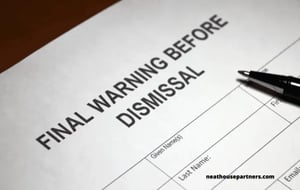Smoking Breaks and the Law
Wednesday 13 March 2024 is National Non Smoking Day, so with this in mind, here’s our guidance on smoking breaks, equal break rights for non-smokers, and what UK law says about smoking breaks.
James Rowland
Commercial Director James leads Account Management, Sales and Marketing at Neathouse Partners.Date
08 April 2024Updated
12 June 2024
Table of contents
On Wednesday 13 March, it’s National Non Smoking Day in the UK. It can be confusing for employers to establish whether or not they need to allow staff smoking breaks, so with this in mind, here’s our guide to smoking policies and smoking breaks at work.
What is Non Smoking Day?
Non Smoking Day in the UK typically falls on 13 March. It’s a health awareness day aimed at encouraging smokers to quit, while continuing to promote education surrounding the dangers of smoking. Non Smoking Day gives smokers a chance to embrace a lifestyle that’s free from smoking, with education, support and quitting programmes promoted to help them quit for good. The day highlights the health benefits of not smoking, and the risks associated with it such as heart disease, cancer, respiratory conditions and other problems associated with well-being. Smoking also costs a smoker a lot of money, and can have financial consequences. As an employer, you can help promote a healthier lifestyle with your employees by encouraging them to take part in Non Smoking Day and by supporting community engagement.
Smoking and UK law
It’s been illegal to smoke in enclosed public spaces and in offices across England and Wales since 2007, which also includes within company vehicles. Employees have no legal right to smoking breaks. Under the Working Time Regulations, the only legal right they have is a 20-minute break if they work for six hours or longer. This break needs to be taken unpaid, unless otherwise noted in the employee’s contract. Employers don’t have to offer extra smoking breaks to staff, or even have designated smoking areas on their premises. To ensure good employee morale however, it’s recommended that employers have a policy for smoking breaks so that employees are aware of expectations. It’s recommended that smoking policies cover cigarettes, electronic cigarettes and vaping products.
The rights of smokers at work are limited because of The Health Act 2006. This act prohibits smoking in indoor spaces such as public spaces, workplaces, bars and restaurants. Employees therefore don’t have a legal right to smoke on workplace premises, and employers must provide a smoking-free environment for their visitors and workers, with clear ‘no-smoking’ signage displayed. There isn’t legislation covering the chewing of tobacco, e-cigarettes or vaping, but employers do have the right to set their own policies regarding the use of these products. It’s very common for employers to have a smoking policy that also covers use of e-cigarettes, tobacco and vaping products. They could for instance prohibit use on company property because of the health risks linked to passive smoking. Employers are responsible for not exposing workers to risks, and consideration needs to be given to workers who may be at risk of inhaling passive smoke, such as pregnant women, or those suffering from asthma or other respiratory issues, or people with cardiovascular (heart or blood vessel) diseases.
Under health and safety laws, employees have a right to daily and weekly rest breaks, including a period of at least 20 minutes to eat and drink (if the working day exceeds six hours), and at least one full day-off every seven days. An employee cannot force someone to work more than an average of 48 hours a week, unless this is confirmed in writing in a contract.
Are smoking breaks a legal requirement?
Letting smokers take breaks as and whenever they want to can cause anger and resentment among ‘non smokers’, who may feel that their smoker colleagues get more time away from work than they do. Some businesses implement policies that enable staff to have shorter lunch breaks so they can have extra smoking breaks throughout the working day.
For instance, a worker may take a half hour lunch break, and then have two 15-minute breaks in the day to smoke. The difficulty with this however is trusting workers to not take a longer amount of time than is allowed. It isn’t uncommon for employers to take a more firm approach and to disallow smoking breaks outside of a one-hour lunch break. Whatever the policy an employer decides to implement, it must be clear and fair to all workers to ensure good morale. If an employee doesn’t comply with an organisation’s smoking policy, disciplinary action can be taken.
Smoking at work and disciplinary action
If an employee breaks the smoking policy at work, you have the right to take disciplinary action against them, such as giving a verbal or written warning. Smoking in violation of a workplace policy could be considered misconduct, but whether or not the action amounts to gross misconduct depends on the circumstances and severity of the breach. For instance, if the person smoked deliberately in a closed environment in front of someone who is pregnant, this could amount to gross misconduct.
Gross misconduct typically refers to serious breaches of workplace rules or conduct that fundamentally undermines the employment relationship, and it can justify dismissal without notice or payment in lieu of notice. Whether smoking constitutes gross misconduct would depend on factors such as the employer’s policies, the nature of the workplace, the frequency of the smoking, and whether or not the actions posed a risk to the health and safety of other workers.
Employers should clearly communicate their smoking policies to employees and ensure they are aware of the consequences of violating these policies. Employers can enforce an outright ban on smoke breaks at work, but they should be prepared for disgruntled workers as a result. Having a total ban on smoking at work could be seen as unreasonable. However, nicotine addiction is not actually listed as a disability under the Disability Discrimination Act 1995, so an employee couldn’t bring a claim of discrimination. However, if you do treat an employee less favourably because of their smoking habits, or create a difficult working environment for them (and they resign as a result), they could potentially file a claim for constructive dismissal.
What should a smoking policy include?
Fundamentally, company smoking policies should be fair to those who smoke, and those who don’t. The policy should cover the following:
- When smokers can (and cannot) smoke, including details of agreed smoking breaks.
- Smoking break rules, including time frames and locations.
- Clearly signposted designated smoking areas that don’t cause harm to others.
- ‘No smoking’ signs around premises and in all company vehicles.
- Details of products that are considered smoking products such as e-cigarettes and vaping products.
- Rules on disposal of cigarette butts and littering.
- Action that will be taken should the smoking policy be breached.
We can help you to develop a smoking policy
Our team of professionals at Neathouse Partners can help you find the right balance and create a smoking policy that benefits both smokers and non-smokers. We can also ensure compliance with any necessary health and safety compliance.
Call 0333 041 1094 today or use our contact form.
Related blog posts

Breach of Employment Contract

What You Need To Know About Contracts Of Employment

Can employers force staff to take holidays at certain times?

Final Written Warning: What UK Employers Need to Know
Have questions?
Get in touch today
Contact us, and our team will get back to you within 24 hours. We value your questions and are committed to getting them answered quickly.


Hello! I am Nicky
Just fill in the form below with your details, and I will arrange for a member of our team to give you a call.
By clicking, you agree to our Privacy Policy



